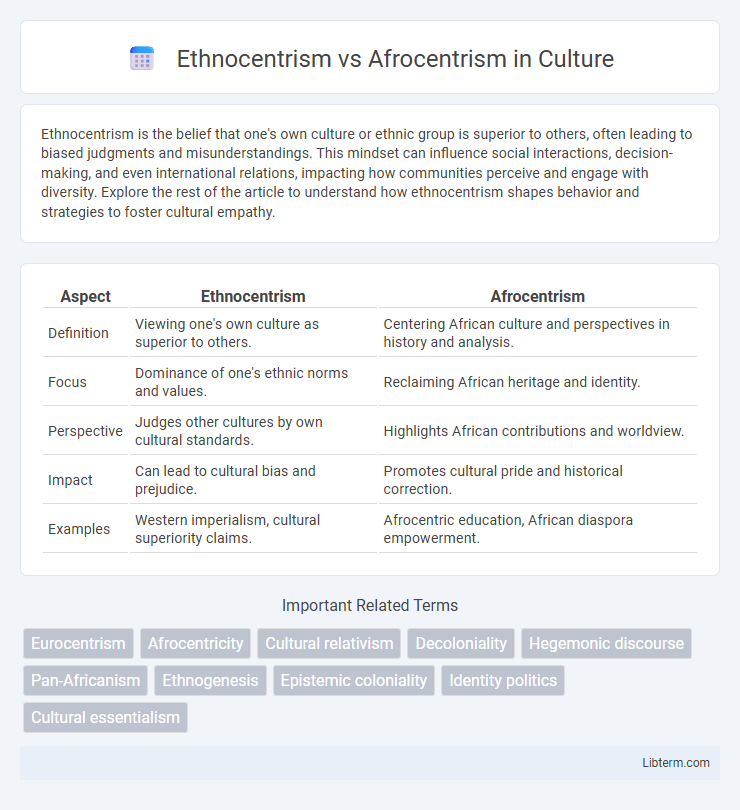Ethnocentrism is the belief that one's own culture or ethnic group is superior to others, often leading to biased judgments and misunderstandings. This mindset can influence social interactions, decision-making, and even international relations, impacting how communities perceive and engage with diversity. Explore the rest of the article to understand how ethnocentrism shapes behavior and strategies to foster cultural empathy.
Table of Comparison
| Aspect | Ethnocentrism | Afrocentrism |
|---|---|---|
| Definition | Viewing one's own culture as superior to others. | Centering African culture and perspectives in history and analysis. |
| Focus | Dominance of one's ethnic norms and values. | Reclaiming African heritage and identity. |
| Perspective | Judges other cultures by own cultural standards. | Highlights African contributions and worldview. |
| Impact | Can lead to cultural bias and prejudice. | Promotes cultural pride and historical correction. |
| Examples | Western imperialism, cultural superiority claims. | Afrocentric education, African diaspora empowerment. |
Introduction to Ethnocentrism and Afrocentrism
Ethnocentrism involves evaluating other cultures based on the standards and values of one's own culture, often leading to cultural bias and misunderstanding. Afrocentrism centers African history and culture as the primary reference point, challenging Eurocentric narratives and promoting African heritage's significance. Both frameworks influence perspectives on identity, history, and cultural interpretation.
Defining Ethnocentrism: A Global Perspective
Ethnocentrism is the tendency to view one's own culture or ethnic group as superior and to use it as a standard to judge other cultures, often leading to cultural bias and misunderstanding. This global mindset can result in discrimination and hinder cross-cultural communication by promoting the belief that other cultural practices are inferior or abnormal. Contrastingly, Afrocentrism centers African perspectives and values as a way to counteract ethnocentric narratives and restore cultural pride among people of African descent.
Understanding Afrocentrism: Roots and Principles
Afrocentrism centers African history, culture, and values as the foundation for interpreting the experiences and contributions of people of African descent, contrasting with ethnocentrism's tendency to evaluate cultures through the lens of one's own ethnic group. Rooted in the works of scholars like Molefi Kete Asante, Afrocentrism emphasizes the reclamation of African identity and challenges Eurocentric narratives that marginalize African achievements. Key principles include celebrating African heritage, promoting cultural pride, and fostering a worldview that highlights African agency and perspectives in global history.
Historical Context: Origins of Both Worldviews
Ethnocentrism originated from European colonial expansion, promoting the belief in cultural superiority based on Western norms and values. Afrocentrism emerged in the late 20th century as a response, centering African history and culture to challenge Eurocentric narratives and reclaim African identity. The historical context of both worldviews reflects a struggle over cultural interpretation and power dynamics rooted in colonialism and post-colonial resistance.
Core Differences Between Ethnocentrism and Afrocentrism
Ethnocentrism centers on judging other cultures based on the values and standards of one's own ethnic group, often leading to cultural bias and superiority beliefs. Afrocentrism emphasizes the importance of African history and culture from an African-centered perspective, aiming to reclaim and celebrate African contributions historically marginalized by Eurocentric narratives. The core difference lies in ethnocentrism's tendency toward cultural judgment versus Afrocentrism's goal of cultural affirmation and historical recontextualization.
Cultural Identity and Worldview
Ethnocentrism centers on evaluating other cultures through the lens of one's own cultural norms, often leading to biased judgments and a limited worldview. Afrocentrism challenges this by re-centering African cultural identity and history as central to interpreting global events, promoting pride in African heritage and a more inclusive worldview. Both perspectives significantly influence cultural identity formation, shaping how individuals perceive their place within the global cultural mosaic.
Impacts on Education and Knowledge Production
Ethnocentrism often leads to biased curricula that prioritize Western perspectives, marginalizing non-Western knowledge systems and reinforcing cultural stereotypes in education. Afrocentrism seeks to counter this by centering African histories, cultures, and philosophies, fostering inclusivity and empowering students of African descent. This shift influences knowledge production by challenging dominant narratives and encouraging diverse epistemologies within academic research and pedagogy.
Social Implications and Power Dynamics
Ethnocentrism enforces dominant cultural norms by privileging one group's worldview, often leading to social exclusion and systemic inequality. Afrocentrism challenges these power dynamics by re-centering African histories and contributions, fostering cultural pride and resistance against marginalization. These contrasting perspectives shape identity formation, social cohesion, and access to resources within multicultural societies.
Challenges and Criticisms of Each Perspective
Ethnocentrism faces criticism for promoting cultural bias and hindering cross-cultural understanding by evaluating other cultures through the lens of one's own, often leading to prejudice and discrimination. Afrocentrism challenges Eurocentric narratives by centering African history and contributions but is criticized for sometimes oversimplifying complex histories or fostering reverse ethnocentrism. Both perspectives grapple with the challenge of balancing cultural pride with inclusivity and historical accuracy, impacting global intercultural dialogue and identity formation.
Towards Inclusivity: Bridging Cultural Understandings
Ethnocentrism often centers on viewing one's own culture as superior, which can hinder cross-cultural understanding and inclusivity, while Afrocentrism emphasizes the importance of African culture and history as central to global narratives, fostering pride and correcting Eurocentric biases. Bridging cultural understandings requires recognizing the value in diverse perspectives, promoting Afrocentric scholarship alongside other worldviews to create a more inclusive and equitable discourse. Integrating these approaches supports mutual respect and enriches global intercultural relations by validating marginalized histories and experiences.
Ethnocentrism Infographic

 libterm.com
libterm.com